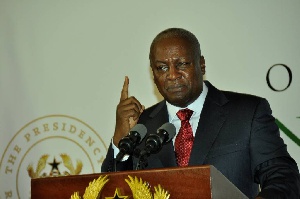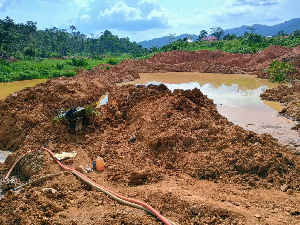President John Dramani Mahama says he cannot go about arresting public officials simply because they are deemed to be corrupt.
“I cannot do that. We live in a democracy. In an unconstitutional government, I would have arrested them and kept them safely and investigated them.”
Addressing journalists at the Flagstaff House in Accra to mark the first anniversary of his election as President last Tuesday, Mr. Mahama was specifically asked about his commitment towards the fight against corruption which many agree has permeated every fabric of the Ghanaian society of late.
“We exist under a constitution now. Ghana has gone through the period of revolutionary justice where if an allegation is made, you just go and pick people and lock them up and then spend time to investigate it.”
He said, “As President, I can’t do that now. All the allegations in GYEEDA, I cannot go and catch them and lock them in Nsawam (Prisons) while the investigation and prosecution go on.
“But you notice that when Ghanaians see the people against whom those allegations are made walking in the streets; they say ‘the man is walking, nothing has been done! The President is not doing anything!”
He asked Ghanaians to “have tolerance for the systems to work,” adding that “now, I have to go through the processes and the Attorney General and EOCO are working on the cases that we have.”
President Mahama said, “Even while the trial is going on, if you see them on the streets it is because they must have their day in court. We will see how things happen.”
He said the government was pursuing what he called “a retrieve of monies that have been lost” and the AG would “be updating the media on how much has been taken back,” but fell short of giving timelines for the retrieval process.
The President however emphasized that corruption “amounts to mass murder. It deprives the government of resources to provide the needed infrastructure for the people,” he said.
President Mahama appeared to explain the circumstances leading to the loss of millions of taxpayer’s money to fraudulent public officials when he said, “I must say that the major problem with GYEEDA was institutional weakness, lack of systems.
“They (GYEEDA) were lucky to get a huge budget from Communication Service Tax for skills development.”
He said even though GYEEDA had been in existence for some time, “we delayed in putting the legislative framework and putting in place the systems of accountability and transparency. While they were commanding huge contracts, they did not have the institutional capacity to ensure accountability in those projects.
“We have taken a bold step. I have asked the AG’s Department and EOCO to prepare the dockets for prosecution. They kept updating me on a fortnightly basis and I am sure you will see some action on GYEEDA.”
He said, “Even the AG has called the service providers to repay those monies and has entered into agreements with them to refund the monies over a period of time.”
The President said he had received the report on the widespread corruption that rattled the Savannah Accelerated Development Authority (SADA), a project meant to improve the livelihoods of people from the Northern part of the country, adding, “Some instructions have gone out to retrieve some monies so the AG will be working on that.
“I want to restate my commitment to fighting corruption. I don’t have any qualms when it comes to the fight against corruption,” he said.
He said even though corruption “is an issue we cannot stop to talk about”, he would not accept the fact that such a serious issue was politicized anytime it was debated, stressing, “Corruption is corruption whether under Rawlings, Kufuor, Mills or Mahama.
“I don’t believe in segmenting corruption. It is no use turning corruption into a political battle,” he said, adding, “As President, it is not important under whose tenure which acts of corruption took place. Every case of corruption from any government, it’s my duty to deal with it.
“We cannot pick and choose. Unfortunately, this has been the discourse in our media. It doesn’t solve the problem of corruption. I have said I am committed. If the allegations are made I will investigate them. If they are real we will deal with them.”
He said, “A lot of corruption occurs because of systems weaknesses and institutional failures. We can’t allow people to indulge in corruption and then we spend the taxpayer’s money to go after them and prosecute them.”
President Mahama said he preferred to tighten the administrative loopholes that allowed public officials to dip their hands into the national purse.
He said the AG had been mandated to take any Auditor General’s Report that comes up and prosecute instances of serious corruption.
General News of Saturday, 11 January 2014
Source: Daily Guide













